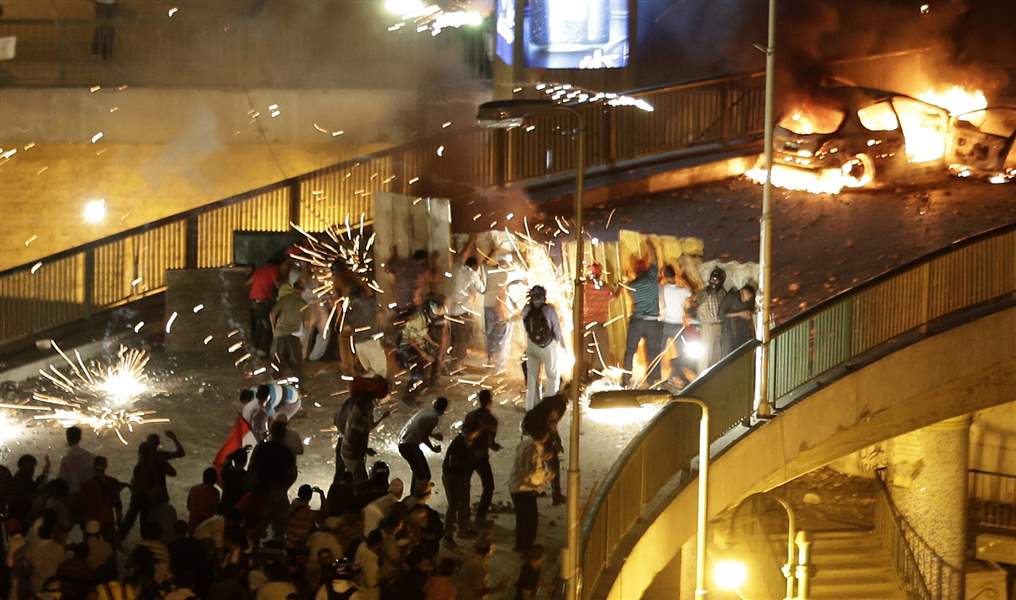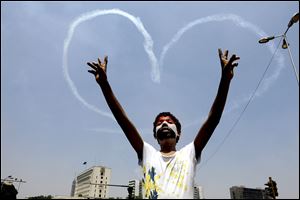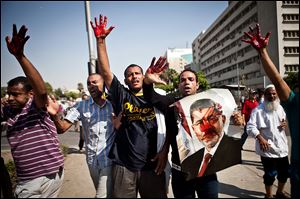
Egypt erupts in violence in wake of Morsi ouster
At least 30 dead as Islamists, foes clash in streets
7/6/2013
Supporters and opponents of Egypt's Islamist President Mohammed Morsi clash in Cairo. Tens of thousands of Islamists took to the streets on Friday, vowing to reinstate the ousted president and end military rule.
ASSOCIATED PRESS

An Egyptian protester flashes v signs as military aircraft formed heart-shaped trails in the sky over Tahrir Square in Cairo on Friday. Clashes erupted when masses of Morsi supporters tried to enter Liberation Square.
CAIRO — Enraged Islamists pushed back against the Egyptian military for ousting President Mohammed Morsi as tens of thousands of his supporters took to the streets on Friday vowing to win his reinstatement and clashed with their opponents in violence that killed at least 30 people and injured hundreds of others.
Across Egypt, demonstrators celebrating Mr. Morsi’s ouster battled crowds of Islamists who wanted him reinstated.
Combatants used rocks, sticks, fireworks, and Molotov cocktails in a battle lasting hours that raged near Liberation Square and across a bridge spanning the Nile.
With clashes breaking out late into the night, it was impossible to estimate the full extent of casualties and damage.
Islamists demanding Mr. Morsi’s reinstatement broke into government offices in several provinces and temporarily evicted military officials.
Fifteen people died in Alexandria alone and a curfew was declared in the Sinai Peninsula, where six soldiers and police officers were killed in at least four attacks on security posts.
The new violence suggested that the military’s removal of Mr. Morsi, the country’s first freely elected president, had worsened the polarization between Islamists who call his ouster a military coup and their opponents who say his removal was the result of an urgent need to fix Egypt’s problems.
By turning out in the tens of thousands, the pro-Morsi crowds underlined the organizational might of the Muslim Brotherhood, which emerged as the major political force and dominated elections after the country’s revolution two years ago.
At that time, the Brotherhood gained power that many in the group had dreamed of for decades.
The military’s intervention in politics this week, following protests by millions of Egyptians angry with Mr. Morsi’s rule, removed the Brotherhood from the government.
The group called the protests the “Friday of Rejection” and chanted for Mr. Morsi’s return.
“We will bring him back bearing him on our necks, sacrifice our souls for him,” Mohammed Badie, the group’s spiritual leader, told crowds at a large demonstration in the Cairo suburb of Nasr City. “We will bring back the rights of the Egyptian people who were wronged by this disgraceful conspiracy.”
Mr. Badie said the reports that he was among the Islamist leaders arrested in a post-Morsi crackdown by security forces were false.
Hundreds of Islamists were detained within a day after Mr. Morsi’s ouster. Some were released Friday.

Islamist protesters, one holding a picture of ousted president Mohammed Morsi, hold up blood-stained hands after troops opened fire on a protest.
An interim president installed by the military, the former chief justice of the Supreme Constitutional Court, Adly Mansour, took a further step Friday to erase the vestiges of Mr. Morsi’s government by formally dissolving the Shura Council.
The council was the country’s only operating house of parliament, which had been dominated by the Islamists. The constitutional court had disbanded the lower house last year, one of many challenges Mr. Morsi had faced in his troubled tenure.
In a further affront to the Islamists, the Egyptian media have marginalized their message in the two days since Mr. Morsi was deposed.
Despite the interim government’s pledge of inclusiveness, Islamist television broadcasters were shuttered and the state television barely covered the breadth of the pro-Morsi demonstrations Friday.
The clashes in downtown Cairo erupted when masses of Morsi supporters marched across a bridge spanning the Nile to try to enter Liberation Square, the epicenter of the uprising that toppled President Hosni Mubarak, which has been the main spot for aggrieved Egyptians ever since.
Anti-Morsi demonstrators camped in the square rushed to keep them out and the two sides clashed on and around a bridge near the Ramses Hilton Hotel and the Egyptian Museum.
Military helicopters circled as the two sides faced off, each protecting its front line with huge sheets of metal. Rioters pelted each other with rocks and chunks of concrete and lobbed fireworks over their opponents’ heads.
The pro-Morsi rioters surged onto the bridge and a battle raged over the Nile for hours until dozens of armored vehicles packed with black-clad riot police were deployed.
The anti-Morsi crowd hailed their arrival with cheers and marched alongside as the armored convoy routed the Islamists off the bridge with blasts of birdshot and volleys of tear gas.

Supporters and opponents of Egypt's Islamist President Mohammed Morsi clash in Cairo. Tens of thousands of Islamists took to the streets on Friday, vowing to reinstate the ousted president and end military rule.
In Washington, the State Department condemned the violence.
“The voices of all who are protesting peacefully must be heard — including those who welcomed the events of earlier this week and those who supported President Morsi,” State Department spokesman Jen Psaki said. “The Egyptian people must come together to resolve their differences peacefully, without recourse to violence or the use of force.”
Gen. Martin Dempsey, chairman of the Joint Chiefs of Staff, on Friday called Israel’s military chief, Lt. Gen. Benny Gantz, for a second time in as many days. The Pentagon said General Dempsey had spoken earlier with Lt. Gen. Sedki Sobhi, the chief of staff of Egypt’s military, although no details about the calls were disclosed.